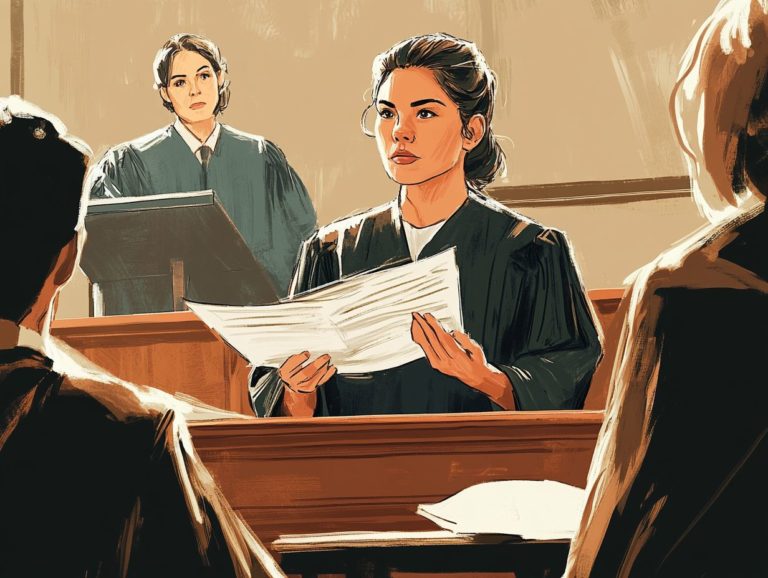What to Know About Your Rights in Family Court
Navigating family court can feel overwhelming. But understanding your rights is the first step to advocacy.
Having a solid grasp of the court system and your rights is essential for effectively advocating for yourself and your family.
This article lays out everything you need to know, from your basic rights and protections to how to prepare your case and explore options for legal representation.
It also delves into alternative dispute resolution methods, such as mediation, offering insights that will support you throughout this challenging journey.
Contents
- Key Takeaways:
- Understanding Family Court
- Your Rights in Family Court
- Preparing for Family Court
- Legal Representation in Family Court
- Alternative Dispute Resolution in Family Court
- Frequently Asked Questions
- What are my rights in family court?
- Do I need a lawyer to protect my rights in family court?
- What happens if my rights are violated in family court?
- Can my rights be terminated in family court?
- What should I do if I do not agree with the court’s decision on my rights?
- Do I have any rights as a witness in family court?
Key Takeaways:

- Know your basic rights, like the right to a fair trial.
- Understand your specific rights in custody and divorce cases.
- Explore all options for legal help, including self-representation and mediation.
Understanding Family Court
Mastering family court can empower you to protect your family’s future. Family courts specifically handle disputes about child custody, visitation, and parenting plans.
These courts focus on what is best for the child, aiming to preserve emotional connections and uphold parental rights.
The court considers factors like substance abuse and custody arrangements, including joint and sole custody.
Its role is to facilitate decisions that prioritize the child’s welfare, creating an environment where families can heal and adjust.
Overview of the Court System and its Purpose
The family court system plays a crucial role in resolving child custody disputes. It ensures that the legal and parental rights of all parties are respected.
This branch of the judicial system is tailored to address sensitive family matters, with a focus on the child’s best interests.
Family courts help people settle disagreements through mediation and make decisions that affect the lives of the children involved.
By adhering to established legal guidelines, these courts strive to create a fair process that nurtures healthy relationships and responsible parenting.
Your Rights in Family Court
Grasping your rights in family court is crucial for advocating for your child’s best interests, especially regarding custody and court orders.
Basic Rights and Protections
In family court, you have fundamental rights and protections that are crucial to your case. You are entitled to fair legal representation, the chance to voice your concerns about child custody, and access to resources aimed at child protection.
These rights enable you to present your case effectively, fostering equitable outcomes for everyone involved. As a parent, you can advocate passionately for your children’s best interests.
Children also gain representation through legal advocates and guardians ad litem, ensuring their voices are heard. Family courts implement various child protection measures to guard against abuse or neglect.
Resources such as counseling services, parenting classes, and mediation support are available to help you navigate these challenges. By prioritizing these rights, the system strives to create a safer and more just environment for you and your children.
Specific Rights in Different Types of Cases

Specific rights in family court can vary greatly depending on the type of case you’re involved in. This is especially true for child custody disputes, visitation arrangements, and legal custody considerations.
Understanding these rights is essential for you as a parent navigating the complex landscape of family law.
In child custody cases, your rights usually include making significant decisions about your child’s upbringing. This means choices about education, healthcare, and even religious upbringing are in your hands.
Visitation rights are equally important; they determine how and when you, as a non-custodial parent, can spend time with your child. This can profoundly impact your relationship with them.
Legal custody means you have authority over major life choices, while physical custody relates to where your child will live.
Each jurisdiction may have its own specific laws governing these rights. It s crucial to stay informed about your legal standing and seek professional guidance whenever necessary.
Preparing for Family Court
Getting ready for family court is crucial for your success in navigating custody disputes.
It demands careful planning of your documents and a thorough understanding of court procedures to present your case effectively. With the right preparation, you can ensure that your arguments are compelling and that you re fully equipped to advocate for your child’s best interests.
Gathering Evidence and Understanding Procedures
Gathering evidence is not just important; it s your ticket to making a strong case. Understand what types of evidence matter most in child custody disputes and court orders.
To effectively advocate for your rights, become well-versed in the types of evidence that carry weight in sensitive situations. This can include:
- Parental fitness evaluations assessments of your ability to care for your child.
- Character witness testimonies support from people who can vouch for your parenting skills.
- Documentation of parenting plans written agreements detailing how you plan to care for your child.
- Financial records proof of your ability to provide for your child’s needs.
By understanding the legal protocols surrounding visitation rights and custody arrangements, you enable yourself to make informed decisions. This way, the courts can assess the best interests of the child based on solid evidence and knowledgeable testimony.
Legal Representation in Family Court
In family court, having legal representation is essential for parents like you who aim to safeguard your rights and navigate the intricacies of child custody disputes.
Legal representation ensures that all critical factors, such as substance abuse and parental rights, are meticulously addressed. This can provide you with the best possible outcome in a challenging situation.
Options for Legal Representation
When considering options for legal representation in family court, you have a few paths to choose from:
- Hiring an attorney who specializes in family law.
- Utilizing legal aid services.
- Representing yourself.
Your choice will largely depend on the complexity of your child custody case and your financial situation. Selecting the right option can significantly influence the outcome of your case, as each comes with its own set of advantages and disadvantages.
Engaging a family law attorney often means you ll receive professional guidance and a thorough understanding of the court system. However, be prepared for potentially high legal fees that could strain your budget.
Legal aid services can help ease some financial burdens by offering reduced or no-cost assistance. Keep in mind that availability and resources can fluctuate, which might result in longer wait times.
If you re feeling particularly confident, representing yourself could save you money. However, navigating the intricate world of legal terminology and procedures alone may not always lead to the results you desire.
Pros and Cons of Self-Representation

Self-representation in family court can feel both enabling and daunting. It allows you to assert your legal rights in child custody cases.
However, it also comes with the risk of missteps in understanding court orders and procedures. Understanding family law can be tough, especially when emotions are running high.
It’s essential to consider the benefits like saving on attorney fees and gaining firsthand insight into the legal process against the potential drawbacks, such as lacking legal expertise and making decisions driven by emotion.
You might believe your personal understanding of your family dynamics equips you to handle your own hearings effectively. However, without a clear grasp of relevant laws and procedures, you risk inadvertently undermining your position.
This could ultimately affect not just your rights, but also the well-being of your children involved in custody decisions.
Alternative Dispute Resolution in Family Court
Alternative dispute resolution (ADR) in family court, including mediation and negotiation, provides effective ways to resolve child custody and visitation disputes amicably.
This approach prioritizes the best interests of the child, allowing parents to navigate sensitive matters with care and consideration.
Mediation and Other Options for Resolving Disputes
Mediation serves as a vital element of alternative dispute resolution in family court. It enables you to collaboratively tackle child custody and visitation disputes with the support of a neutral third-party mediator.
This process not only cultivates open communication between you and the other parent but also steers the focus toward what truly matters the best interests of your children.
By opting for mediation, you gain the chance to craft tailored agreements that reflect your unique family dynamics. This often leads to outcomes that are far more satisfying than those dictated by a court.
Mediation can dramatically ease emotional stress! This approach can significantly alleviate the emotional toll that typically accompanies contentious court battles, preserving relationships and promoting a spirit of cooperative co-parenting.
With this more amicable approach, you and your family can make challenging decisions while minimizing conflict and nurturing healthier interactions for the future.
Frequently Asked Questions
What are my rights in family court?
As an individual involved in a family court case, you have the right to be informed, to be heard, and to have your case decided based on the law.
Do I need a lawyer to protect my rights in family court?

While it is not always necessary to have a lawyer in family court, it is highly recommended. A lawyer can help you navigate the legal process and ensure your rights are protected.
What happens if my rights are violated in family court?
If you feel that your rights have been violated in family court, you should speak with your lawyer and file a complaint with the court. Your lawyer can also help you appeal the decision if necessary.
Can my rights be terminated in family court?
In certain cases, such as child custody or adoption proceedings, your rights as a parent may be terminated by the court. This is typically only done in extreme circumstances and after careful consideration.
What should I do if I do not agree with the court’s decision on my rights?
If you do not agree with the court’s decision regarding your rights, you can file an appeal. It is important to consult with your lawyer and understand the grounds for appeal before taking this step.
Do I have any rights as a witness in family court?
Yes, as a witness in family court, you have the right to be treated with respect, to have your testimony taken seriously, and to be protected from intimidation or harassment. It is important to consult with a lawyer if you have any concerns about your rights as a witness.
Don’t hesitate to seek help to protect your rights!






